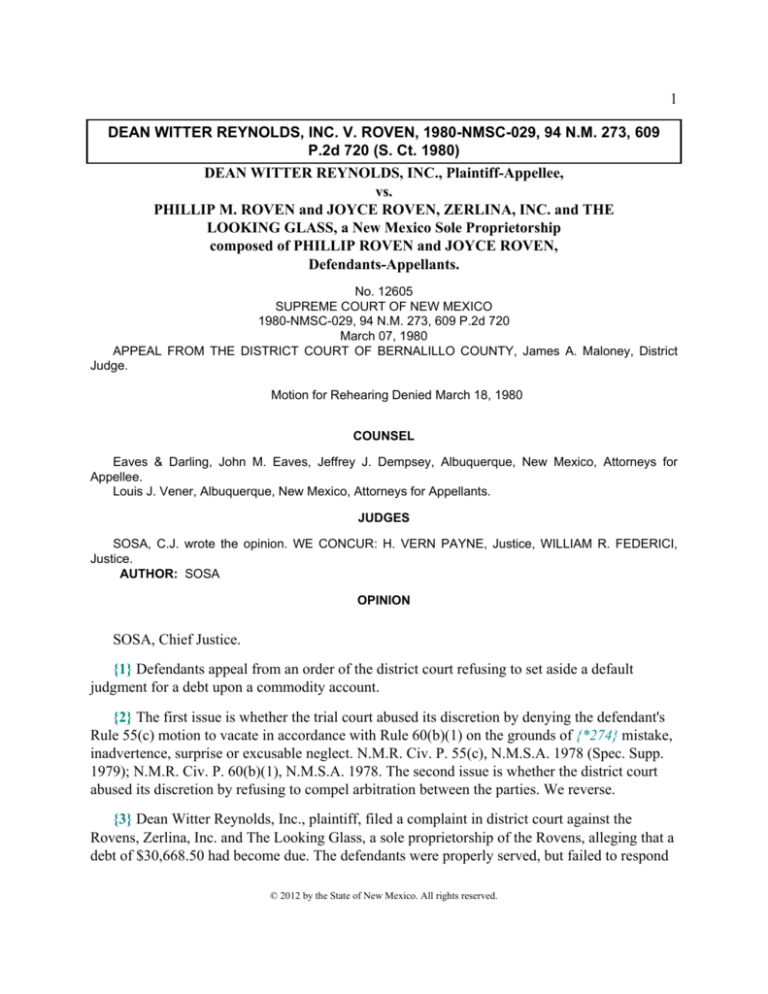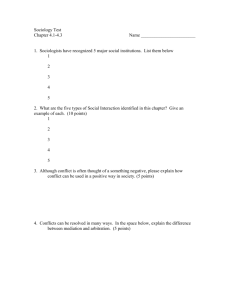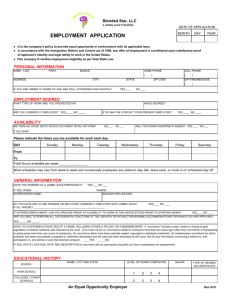
1
DEAN WITTER REYNOLDS, INC. V. ROVEN, 1980-NMSC-029, 94 N.M. 273, 609
P.2d 720 (S. Ct. 1980)
DEAN WITTER REYNOLDS, INC., Plaintiff-Appellee,
vs.
PHILLIP M. ROVEN and JOYCE ROVEN, ZERLINA, INC. and THE
LOOKING GLASS, a New Mexico Sole Proprietorship
composed of PHILLIP ROVEN and JOYCE ROVEN,
Defendants-Appellants.
No. 12605
SUPREME COURT OF NEW MEXICO
1980-NMSC-029, 94 N.M. 273, 609 P.2d 720
March 07, 1980
APPEAL FROM THE DISTRICT COURT OF BERNALILLO COUNTY, James A. Maloney, District
Judge.
Motion for Rehearing Denied March 18, 1980
COUNSEL
Eaves & Darling, John M. Eaves, Jeffrey J. Dempsey, Albuquerque, New Mexico, Attorneys for
Appellee.
Louis J. Vener, Albuquerque, New Mexico, Attorneys for Appellants.
JUDGES
SOSA, C.J. wrote the opinion. WE CONCUR: H. VERN PAYNE, Justice, WILLIAM R. FEDERICI,
Justice.
AUTHOR: SOSA
OPINION
SOSA, Chief Justice.
{1} Defendants appeal from an order of the district court refusing to set aside a default
judgment for a debt upon a commodity account.
{2} The first issue is whether the trial court abused its discretion by denying the defendant's
Rule 55(c) motion to vacate in accordance with Rule 60(b)(1) on the grounds of {*274} mistake,
inadvertence, surprise or excusable neglect. N.M.R. Civ. P. 55(c), N.M.S.A. 1978 (Spec. Supp.
1979); N.M.R. Civ. P. 60(b)(1), N.M.S.A. 1978. The second issue is whether the district court
abused its discretion by refusing to compel arbitration between the parties. We reverse.
{3} Dean Witter Reynolds, Inc., plaintiff, filed a complaint in district court against the
Rovens, Zerlina, Inc. and The Looking Glass, a sole proprietorship of the Rovens, alleging that a
debt of $30,668.50 had become due. The defendants were properly served, but failed to respond
© 2012 by the State of New Mexico. All rights reserved.
2
in thirty days.
{4} Plaintiffs, without notice, moved for a default judgment, which was entered. Three days
later the defendants filed a motion to set aside the judgment, attached an affidavit giving the
reasons for the failure to answer and attached a proposed answer. The trial court granted the
defendants a stay of execution and issued an order to show cause why judgment should not be set
aside. This was later amended to put the burden on the defendants to show cause why the
judgment should be vacated. Defendants later moved to dismiss for lack of jurisdiction under
Rule 12(b)(1), claiming the dispute was subject to arbitration. N.M.R. Civ.P. 12(b)(1), N.M.S.A.
1978. A hearing was then held, combining the motion to set aside, the motion to dismiss and a
hearing on the merits. The trial court ruled that the default judgment was proper, that it should
not be vacated, and that defendants waived their claim to arbitration.
{5} When we review a trial court's ruling on a motion to set aside a default judgment, we will
not disturb the ruling unless the court acted beyond the confines of sound discretion. Springer
Corporation v. Herrera, 85 N.M. 201, 510 P.2d 1072 (1973). But "because courts universally
favor trial on the merits, slight abuse of discretion in refusing to set aside a default judgment will
often be sufficient to justify reversal of the order." (Citation omitted.) Id. at 203, 510 P.2d at
1074. In Springer Corporation v. Herrera, supra, we stated that the trial court must apply a
liberal standard in determining (1) whether there is excusable neglect and (2) whether the
defendants have a meritorious defense. If these two issues are decided in the affirmative in
accordance with Rule 60(b)(1), and there are no intervening equities, the default judgment
should be set aside and the case decided on its merits. Weisberg v. Garcia, 75 N.M. 367, 404
P.2d 565 (1965).
{6} In the present case, the defendants argue that their failure to file a timely answer was
excusable because settlement negotiations were taking place at the time the default judgment
was entered. The defendants claim that they were told by the plaintiff that he would not move for
default judgment so long as negotiations continued. Though they did not enter an appearance or
file pleadings, they argue that a default should not have been entered against them without
notice.
{7} Rule 55 provides that a party who has entered an appearance must be given three days
notice before a default judgment can be entered. N.M.R. Civ.P. 55 (b), N.M.S.A. 1978 (Spec.
Supp. 1979). Though the letter of this law does not apply, the spirit certainly does. The plaintiff
was in contact with the defendants, knew their whereabouts, was possibly negotiating with them,
and even represented that no default would be entered during settlement negotiations. Yet no
notice of the motion for default was given to defendants. Under these circumstances, and
because of the lack of prejudice to the plaintiff, we believe that the defendants' failure to answer
in thirty days was excusable neglect. We also believe that the trial court's opposite determination
was a sufficient abuse of discretion to warrant a reversal on this issue. It is to be stressed,
however, that this Court does not condone the untimely filing of any pleadings. Absent a
showing of excusable neglect, the policy in favor of finality of judgments should prevail.
© 2012 by the State of New Mexico. All rights reserved.
3
{8} The trial court also abused its discretion in ruling that the defendants did not show a
meritorious defense. The defendants claim as a meritorious defense, inter alia, {*275} that the
dispute is subject to arbitration under the terms of the contract between themselves and the
plaintiffs. The contract provided in part:
Any controversy between [Dean Witter Reynolds] and the undersigned arising out of or
relating to this contract or the breach thereof, shall be settled by arbitration, in accordance with
the rules, then obtaining, of either the Arbitration Committee of the Chamber of Commerce of
the State of New York, or the American Arbitration Association, or the Board of Arbitration of
the New York Stock Exchange, as the undersigned may elect. If the undersigned does not make
such election by registered mail addressed to [Dean Witter Reynolds'] main office within five (5)
days after receipt of notification from [Dean Witter Reynolds] requesting such election, then the
undersigned authorizes [Dean Witter Reynolds] to make such election in behalf of the
undersigned.... (Emphasis added.)
The plaintiff argues that the defense of arbitration was never properly asserted and was
therefore waived. In order to determine whether waiver has occurred, we must look to the
Federal Arbitration Act, 9 U.S.C. §§ 1 to 14 (1976).
{9} The Federal Arbitration Act, 9 U.S.C. §§ 1 to 14, applies where (1) there is a written
arbitration provision in the contract; (2) the contract evidences a transaction involving interstate
commerce; (3) the court is satisfied that the issue is subject to arbitration under the agreement,
and (4) the applicant is not in default in proceeding with such arbitration. Episcopal Housing
Corp. v. Federal Ins. Co., 269 S.C. 631, 239 S.E.2d 647 (1977). The contract in the present
case concerned commodity trading of gold futures, and is within the purview of the Federal
Arbitration Act. Romnes v. Bache & Co., Inc., 439 F. Supp. 883 (1977). It is clear that the
contract contains an arbitration clause which would apply to this dispute. In making a
determination whether a default occurred, we are guided by the policy against waiver of
arbitration rights unless one's conduct has gained him undue advantage or resulted in prejudice
to another. See Hanes Corp. v. Millard, 174 U.S. App.D.C. 253, 531 F.2d 585 (1976); United
Nuclear Corp. v. General Atomic Co., 93 N.M. 105, 597 P.2d 290 (1979), cert. denied, 444
U.S. 911, 100 S. Ct. 222, 62 L. Ed. 2d 145 (1979).
{10} In United Nuclear v. General Atomic Co., supra, we held that a party had waived its
right to arbitration. In that case, General Atomic Company had not properly manifested its desire
to arbitrate for a period of twenty-seven months after suit was filed, and the parties had spent
millions of dollars on discovery proceedings and trial preparation. United Nuclear Corp. v.
General Atomic Co., supra. The facts of the present case are clearly distinguishable. The
defendants have pursued litigation only because no other feasible alternative was available. They
had to have the judgment vacated before they could either arbitrate or go to trial on the merits.
They did not act inconsistently with a claim for arbitration and the opposing party was not
prejudiced.
© 2012 by the State of New Mexico. All rights reserved.
4
{11} Though the defendants could have raised the issue in a more appropriate manner, the
existence of a defense of arbitration was without a doubt brought to the attention of the court in
time. The contract containing the arbitration clause was attached to the plaintiff's complaint as an
exhibit. In addition, the defense of arbitration was specifically asserted in the Rule 12(b)(1)
motion to dismiss for lack of subject matter jurisdiction. N.M.R. Civ.P. 12(b)(1), N.M.S.A. 1978.
This was filed four weeks before the hearing on whether to vacate the default judgment. Though
a valid arbitration defense does not divest the court of jurisdiction, and is not properly raised by
a Rule 12(b)(1) motion, we are persuaded that such a motion was sufficient to put the court on
notice that a meritorious defense existed. Cf. Diaz-Buxo v. Trias Monge, 593 F.2d 153 (1st Cir.
1979), cert. denied, 444 U.S. 833, 100 S. Ct. 64, 62 L. Ed. 2d 42 (1979); Williams v. Murdoch,
330 F.2d 745 (3rd Cir. 1964). (A rule 12(b)(1) {*276} motion may be used to raise an affirmative
defense where no prejudice will result to the opposing party.)
{12} We conclude that under the Federal Arbitration Act, waiver did not occur. A
meritorious defense was therefore shown, and the trial court abused its discretion by not setting
aside the default judgment. The trial court must also give effect to the terms of the contract and
compel arbitration between the parties.
{13} The matter is reversed and remanded to the district court to allow appellants to elect, by
registered mail, the arbitrators they would prefer. If the election is not made within five days
after mandate, the appellee may make the election as provided for in the contract between the
parties. The appellees' request for attorneys fees on appeal is denied.
{14} IT IS SO ORDERED.
WE CONCUR:
PAYNE, Justice.
FEDERICI, Justice.
——————————
© 2012 by the State of New Mexico. All rights reserved.









